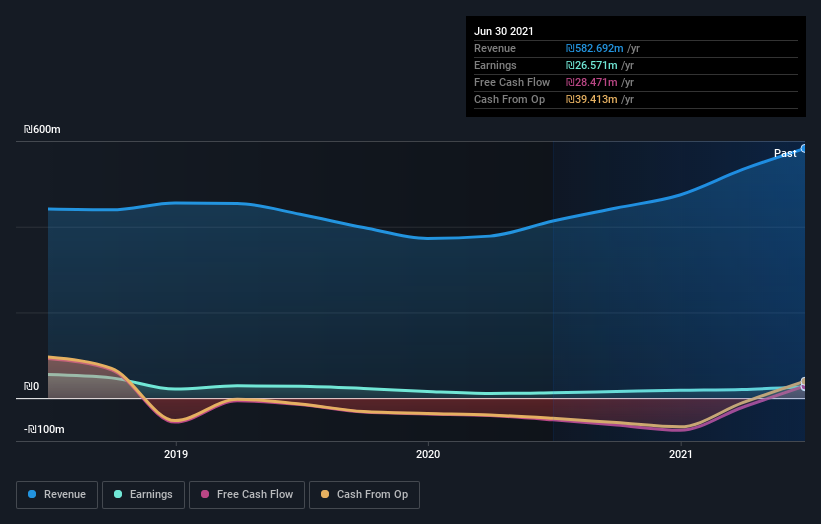- Israel
- /
- Diversified Financial
- /
- TASE:KRDI
Kardan Israel (TLV:KRDI) shareholders notch a 57% CAGR over 3 years, yet earnings have been shrinking

It might seem bad, but the worst that can happen when you buy a stock (without leverage) is that its share price goes to zero. But if you buy shares in a really great company, you can more than double your money. To wit, the Kardan Israel Ltd (TLV:KRDI) share price has flown 160% in the last three years. How nice for those who held the stock! In more good news, the share price has risen 34% in thirty days.
Since it's been a strong week for Kardan Israel shareholders, let's have a look at trend of the longer term fundamentals.
See our latest analysis for Kardan Israel
There is no denying that markets are sometimes efficient, but prices do not always reflect underlying business performance. One way to examine how market sentiment has changed over time is to look at the interaction between a company's share price and its earnings per share (EPS).
During the three years of share price growth, Kardan Israel actually saw its earnings per share (EPS) drop 20% per year.
This means it's unlikely the market is judging the company based on earnings growth. Given this situation, it makes sense to look at other metrics too.
Languishing at just 0.9%, we doubt the dividend is doing much to prop up the share price. It could be that the revenue growth of 6.4% per year is viewed as evidence that Kardan Israel is growing. If the company is being managed for the long term good, today's shareholders might be right to hold on.
The graphic below depicts how earnings and revenue have changed over time (unveil the exact values by clicking on the image).

Balance sheet strength is crucial. It might be well worthwhile taking a look at our free report on how its financial position has changed over time.
What About Dividends?
As well as measuring the share price return, investors should also consider the total shareholder return (TSR). Whereas the share price return only reflects the change in the share price, the TSR includes the value of dividends (assuming they were reinvested) and the benefit of any discounted capital raising or spin-off. So for companies that pay a generous dividend, the TSR is often a lot higher than the share price return. We note that for Kardan Israel the TSR over the last 3 years was 285%, which is better than the share price return mentioned above. And there's no prize for guessing that the dividend payments largely explain the divergence!
A Different Perspective
Pleasingly, Kardan Israel's total shareholder return last year was 69%. That's including the dividend. That gain actually surpasses the 57% TSR it generated (per year) over three years. Given the track record of solid returns over varying time frames, it might be worth putting Kardan Israel on your watchlist. It's always interesting to track share price performance over the longer term. But to understand Kardan Israel better, we need to consider many other factors. For example, we've discovered 1 warning sign for Kardan Israel that you should be aware of before investing here.
If you like to buy stocks alongside management, then you might just love this free list of companies. (Hint: insiders have been buying them).
Please note, the market returns quoted in this article reflect the market weighted average returns of stocks that currently trade on IL exchanges.
Valuation is complex, but we're here to simplify it.
Discover if Kardan Israel might be undervalued or overvalued with our detailed analysis, featuring fair value estimates, potential risks, dividends, insider trades, and its financial condition.
Access Free AnalysisHave feedback on this article? Concerned about the content? Get in touch with us directly. Alternatively, email editorial-team (at) simplywallst.com.
This article by Simply Wall St is general in nature. We provide commentary based on historical data and analyst forecasts only using an unbiased methodology and our articles are not intended to be financial advice. It does not constitute a recommendation to buy or sell any stock, and does not take account of your objectives, or your financial situation. We aim to bring you long-term focused analysis driven by fundamental data. Note that our analysis may not factor in the latest price-sensitive company announcements or qualitative material. Simply Wall St has no position in any stocks mentioned.
About TASE:KRDI
Kardan Israel
Through its subsidiaries, engages in the real estate business in Israel and the United States.
Second-rate dividend payer with questionable track record.
Market Insights
Community Narratives



